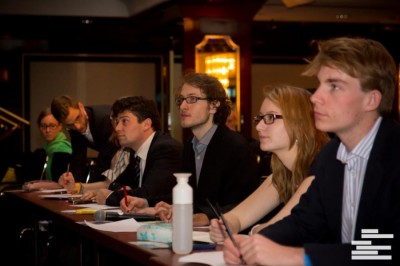„A waste of time to examine context?“ – Steve Llano on the ethics of the chair
Unter dem Eindruck von Erlebnissen während des Vienna IV plädiert der US-amerikanische Rhetorikprofessor und Debattier-Coach Steve Llano für ein „ethical judging“. Dieser Beitrag erschien zuerst auf seinem Blog Progymnasmata.
The Vienna IV seems like a competition that time forgot. It’s a competition that reaches back to European debate the way it was long before I got involved in it, to a time when the more weird or inside-joke funny the motion was, the better the tournament. These are examples of motions and procedures that operated debate societies before the current trend of making competitions tied at least somewhat to the tone and direction of the WUDC.
What I recall the most is how the adjudication team at both Vienna IVs are incredibly autocratic – they cannot stand the idea of a debate going in a direction that they did not directly desire or imagine it would go. They generate tons of rules about how one ought to approach a debate, and what is allowed or not allowed when a particular type of motion appears. Here I present a case-study of the desire of the adjudication team, the work of the teams in a debate to create persuasive discourse, and the role of the person meant to evaluate the quality of that discourse – the chair. I believe that instead of chairs striving to get calls „right,“ chairs need to get calls „ethical“ – that is they need to work hard to make sure that all of the people in the debate are attended to well. Of course, the ethical one is not easy, and people love to call people out for breaking the rules.
In round two, a motion appeared that we were warned about in the long and repetitive briefings. We were told that there were some motions that were meant to force a choice – they were mutually exclusive by fiat of the adjudication team, and therefore the teams could not claim that they would be able to get both of the options. The motion was something to the effect that if a doctor was faced with prolonging a life and causing indefinite pain or ending the life then and there, he or she should end the life. Not sure about the exact wording, but the motion is carefully hinting that the debate should be, according to the adjudication core, about the choice between death and a painful life without a clear end in sight. The point to keep in mind is that the doctor had to choose between prolonging the life painfully or ending it immediately.
In the room I was judging in (as a wing, blessedly, for all of the rounds I was able to judge – thank you Vienna IV tab room, you really get me) the closing government offered the following argument: If we keep the person alive as long as possible, we might have a shot at getting both a reduction in pain and a long life because we will learn more about how to treat the condition. Compared to the Opening Government’s argument of „Only God can take a life“ and an interpretation that the Hippocratic oath forces doctors to keep people alive „no matter the cost“ – I thought it was pretty clear their argument was at least better than opening’s.
Our chair could not even let one of the wings finish talking. Instead, she excitedly talked about how the closing government deserved a four for ignoring the numerous instructions on how to debate this motion from the „A-team“ (as she called them, made me think George Peppard was hanging around somewhere). I tried a couple of times to offer the idea that perhaps we should evaluate what the teams said in context with what the other teams said – to which the chair always responded, „It’s a shame we have to waste time on this.“ This was the only response she gave me – I think that it was because I was, in her view, also deliberately ignoring the rules of the A-team (confession: I was).
But a waste of time to examine context? What are we meant to be doing otherwise? This is where the distinction between chairing and ethical chairing came into my mind.
This was a moment that made me realize that judges who enforce abstract rules about good debating are not straw people. They actually exist, and are given enormous authority by the rules of BP to enact their rule interpretations upon speakers. What I suggest a chair should do is understand that good discourse is only discernible within a context. This chair refused to consider the discourse as even potentially good, mainly because they „broke the rules.“
An alternate defense she gave of ranking them four was that the closing opposition made the argument that the closing government was trying to „do both things, which the A-team (where’s Face?) told us we couldn’t do.“ Not only is this argument unexplained, it is an appeal to authority, which I believe not many reasonable people would just accept without asking the question, „should they win because they pointed out a broken rule?“
I felt that the opening opposition was ignored in this approach, who did a good job answering the poor arguments of the opening government. Under this chair’s rubric, that part of the debate no longer mattered for determining a winner – the team that points out the broken rule should win, and that’s that. Good contextual argument, although not the best in the world, is always trumped by a team who repeatedly points out „the team across from us broke the rule we heard about in the briefing.“
The ethics of chairing involve attending to each team’s contribution. This is only possible within the context of what was said in the debate before us. Otherwise, we could have judges sit in different rooms than the debaters and come up with decisions on whatever merits they wished. What this decision reinforced is an approach to debating that I call „gotcha!“ debate – the team that wins is the one that most solidly points out the mistakes of the other team. Until this round, I always thought that this was a novice debater attempt to make good arguments. It’s no longer a straw position, as I’ve found someone who actually judges this way. It’s amazing to find one.
What’s wrong with this position? Shouldn’t rules be followed?
They should, of course. They make a competition fair and generate the motives we like from competitive debating. The problem arises – as it did in Vienna last year – when adjudication teams offer their own rules on-the-fly for how the motions should be approached. These rules are motivated from a good place. They are worried that the debates on the motions they set will be bad unless they are approached in a particular way – the only way they could imagine. It is never assumed by such adjudication teams that anyone could think through a motion in a different, or more creative manner. They assume their way of approaching is the only possible good one. So they legislate the approach, cutting off the debaters‘ access to their own imaginative approaches to debating a motion.
On the other hand, the adjudication team could be motivated by the idea that somehow the debates are going to be bad, because the debaters will be unable to see how to make the debate „good.“ This also motivates adjudication teams to make up their own motion rules, often legislated spuriously via a „context slide“ or other such device. All this serves to do is flatten the debate experience, homogenize it, and kill the desire of the debaters to try creative, persuasive approaches that might make adjudicators nod and think, „didn’t expect that!“ – this is the experience that a lot of adjudicators want, but don’t necessarily get.
I’ve written in more detail about how bad game design is design that is meant to improve the player’s experience by limiting options. All it does is limit the experience of the game, which comes from play – the player must be allowed to interact with the game in ways the designer cannot foresee. This is where the value of a well-designed game arises.
But what role does the chair have in good game design?
I see great value coming from a chair who is aware of the adjudication team’s desire for a good debate, but also willing to assume that the teams are attempting to reach that desire through the environment they face. This means that the chair does not read, as mine did, the debaters as trying to „get away“ with something, as trying to „break the rules“ but instead trying to reach the goal of a persuasive argument in order to fulfill the obligation of creating a good debate. This is the ethical approach – assuming that the other humans in the debate, by virtue of their presence, want a good debate as well – and it is the starting point for chairing. It frames the chair’s approach to listening and helping wings articulate why they might like one team over another one. That reason is always because they improved the debate by responding to and dealing with the context in which their speech emanates.
It is something we valorize when a persuasive speaker is able to use restrictions such as rules and skirt them – especially rules like I’ve seen at Vienna which curtail freedom of speech and expression: „one must speak this way, given a motion worded with these terms, etc.“ Those who are clever and can read the rules back against themselves in their argumentation might be teams that are deserving of winning a debate. These things take careful skill and great rhetorical prowess, but these are the moments that keep us returning to debate. As chairs, people must keep an eye and ear open to such moves, understanding that the reasonable audience in the world of controversy and deliberation often is moved by those who use satire, equivocation, and sarcasm to expose the rules for what they can be – ideological restrictions that assume the speaking subjects are malformed or incapable of persuasive speech.
When chairing, remember that everyone wants a good debate. They are not there to try to trick you, or get away with something, or create chaos by breaking your rules. And you have an obligation to listen to them in the context that they speak. You owe it to debating. For the chair’s Hippocratic oath is not to keep the idea of a potentially good debate alive as long as possible – no, just like the real Hippocratic oath, the chair’s mantra is simple: Do no harm. We do no harm when we attend to context before we attend to the desires and ideology of the adjudication team when we evaluate the quality of debate speeches.
Steve Llano/hug/kem
The Mittwochs-Feature: every Wednesday at 10 am, the “Wednesday Feature” introduces an idea, a debate, a book or a person. If you want to kick off a debate, send us your proposal via email at team [at] achteminute [dot] de.
Stephen M. Llano, Ph.D., is Assistant Professor of Rhetoric and Director of Debate at St. John’s University in Queens, New York. He studied rhetorical theory, argumentation theory, and the intersection of Eastern philosophy and debate pedagogy. He has coached debate in the United States for more than 20 years at both the High School and University level. He holds a Ph.D. in Communication from the University of Pittsburgh, and regularly travels worldwide to lecture and teach on debating.








